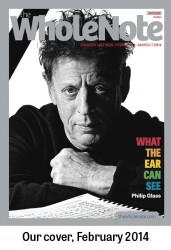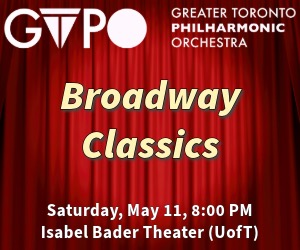 The April 14 announcement of Philip Glass from the Koerner Hall stage as the 2015 winner of the $100,000 Glenn Gould Prize was perhaps more imbued with history for one of the jurors, pipa player Wu Man, than anyone else on the stage. Granted, she was just one of a distinguished international jury of ten (including jury chair Bob Ezrin). They convened in Toronto for a 48-hour period, charged with the near-impossible task in that short time of whittling down to one winner a briefing book of 80 nominees.
The April 14 announcement of Philip Glass from the Koerner Hall stage as the 2015 winner of the $100,000 Glenn Gould Prize was perhaps more imbued with history for one of the jurors, pipa player Wu Man, than anyone else on the stage. Granted, she was just one of a distinguished international jury of ten (including jury chair Bob Ezrin). They convened in Toronto for a 48-hour period, charged with the near-impossible task in that short time of whittling down to one winner a briefing book of 80 nominees.
Where Wu Man stood out on the jury is that in her previous brush with the Glenn Gould Foundation, she was a winner herself – not of the Glenn Gould Prize, but as 1999 Gould laureate Yo-Yo Ma’s choice for the accompanying City of Toronto protégé prize, whom the laureate himself (yes so far the laureates have all been men) chooses.
Being chosen as Ma’s 1999 protégé was immensely significant for Wu Man. “When I received the protégé prize in 1999 I can say it changed my musical life,” she told me backstage at Koerner, after the announcement, “because in 1999 I was just landed in North America from China and the prize actually inspired me to think of larger musicianship and encouraged me to explore new ways to communicate with people through music. So this year I am back but since 1999 I have been working differently in music. It’s a great honour to be back and sitting in the jury side by side with all those highly respected individuals.”
As have most of the Glenn Gould Prize laureates, Ma embraced the term protégé in its fullest sense, drawing Wu Man into his closest circle of trusted collaborators. “Yes. He took it seriously. I am a founding member of the Silk Road Project and still working together very strongly after 15 years. Definitely as a protégé I experienced a protection, growth as a musician. And it opened my mind. And that is because of this prize and the opportunity it gave.”
 Interestingly, Wu Man’s connections with this year’s prize winner are also direct and personal: “I had no idea when I was in China who Philip Glass was. So as I came gradually to learn about American musical styles, minimalism, working with Philip Glass has been a highlight in my musical life experience. ”
Interestingly, Wu Man’s connections with this year’s prize winner are also direct and personal: “I had no idea when I was in China who Philip Glass was. So as I came gradually to learn about American musical styles, minimalism, working with Philip Glass has been a highlight in my musical life experience. ”
“I will tell you this” she continued. “He is not only the Philip Glass of so many music achievements, a great composer of our time, but he is also a really nice human being – really very nice. I remember I went to his apartment in New York City to improvise. He said ‘play something’; I said how about a Buddhist tune? And just improvised and he just gradually put hands on the piano and started to play and then I said ‘Philip, that wasn’t the key! It’s wrong!’ and he said ‘oh, oh oh, okay sorry ... just carry on, I will catch up with you later.’ So that gives me my sense of him: very human, as a musician and a person; very comfortable to work with.”
Bob Ezrin, chair of the jury, had this to say about Glass. “Philip Glass is one of the towering figures of modern music. With an iconic career that has spanned 50 years, his body of work is unrivalled in its breadth and depth. He not only helped to reclaim tonality as a vital force in serious music, he took minimalism and brought it from the fringes of the avant-garde to the mainstream.”
For Brian Levine, director of the GGF, the 11th laureate brings “the Prize” closer to to the elusive goal of “Nobel Prize for the Arts,” a universal “touchstone for excellence in the arts as a testament to the human creative spirit, as Glenn Gould himself was.” And of Glass he says: “In his work and life, he reveals himself to be a man of deep spirituality and conscience as reflected in the themes of his operatic creations and film scores. We are honoured to present the Prize to an artist of such originality, conviction and vision.”
The other jury members were: Petula Clark (UK); Adrienne Clarkson (Canada); Jay Hunter Morris (United States); HRH Julie of Luxembourg (Switzerland), Martin Katz (Canada); Michael Ondaatje (Canada); Sarah Polley (Canada); and Deborah Voigt (United States).
And lest in focusing on this year’s laureate we lose sight of the human dynamo whose name the award bears, broadcaster and writer David Jaeger, elsewhere in this issue (page 76), offers up some of his own memories of Glenn Gould, the man.



